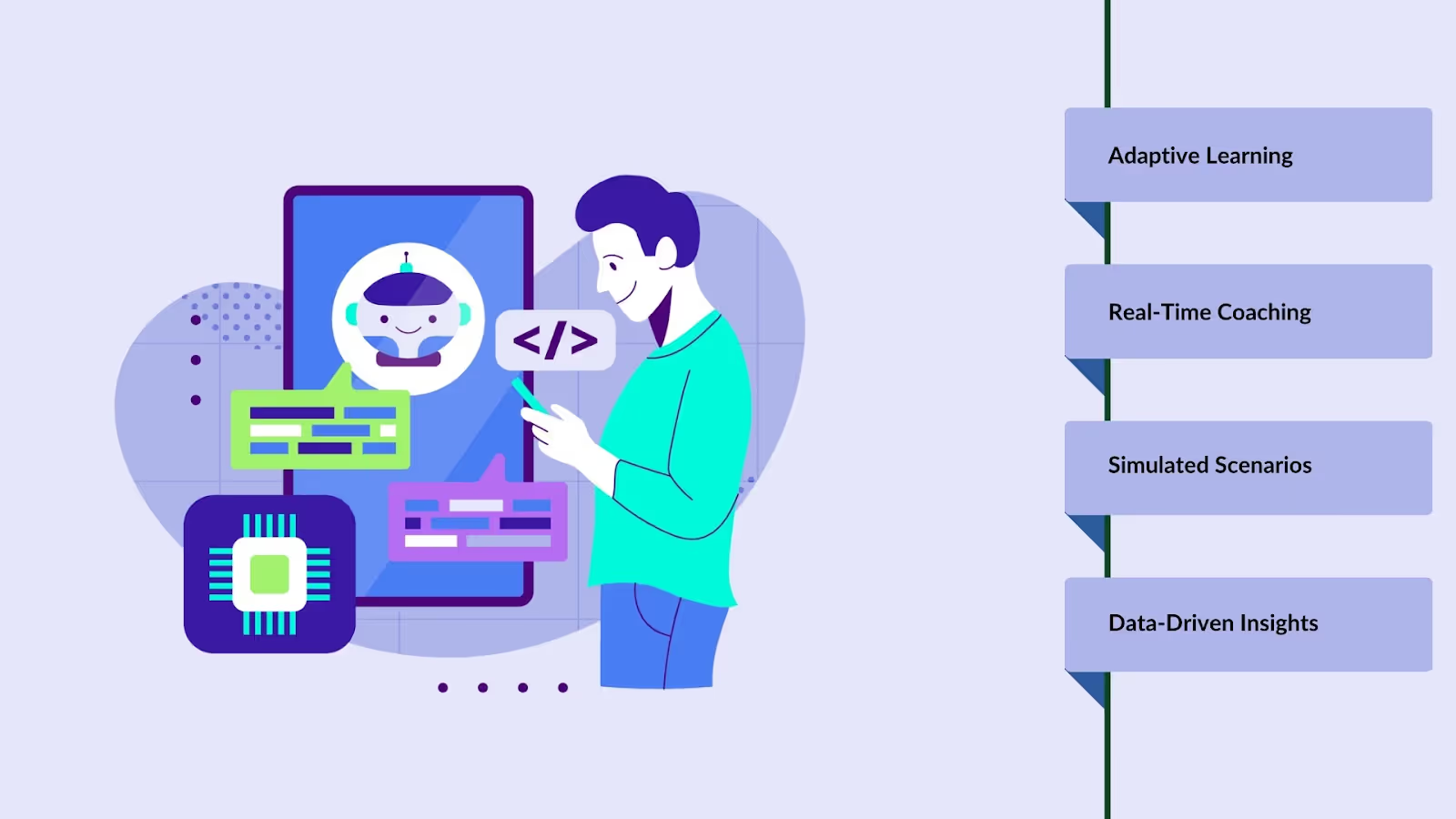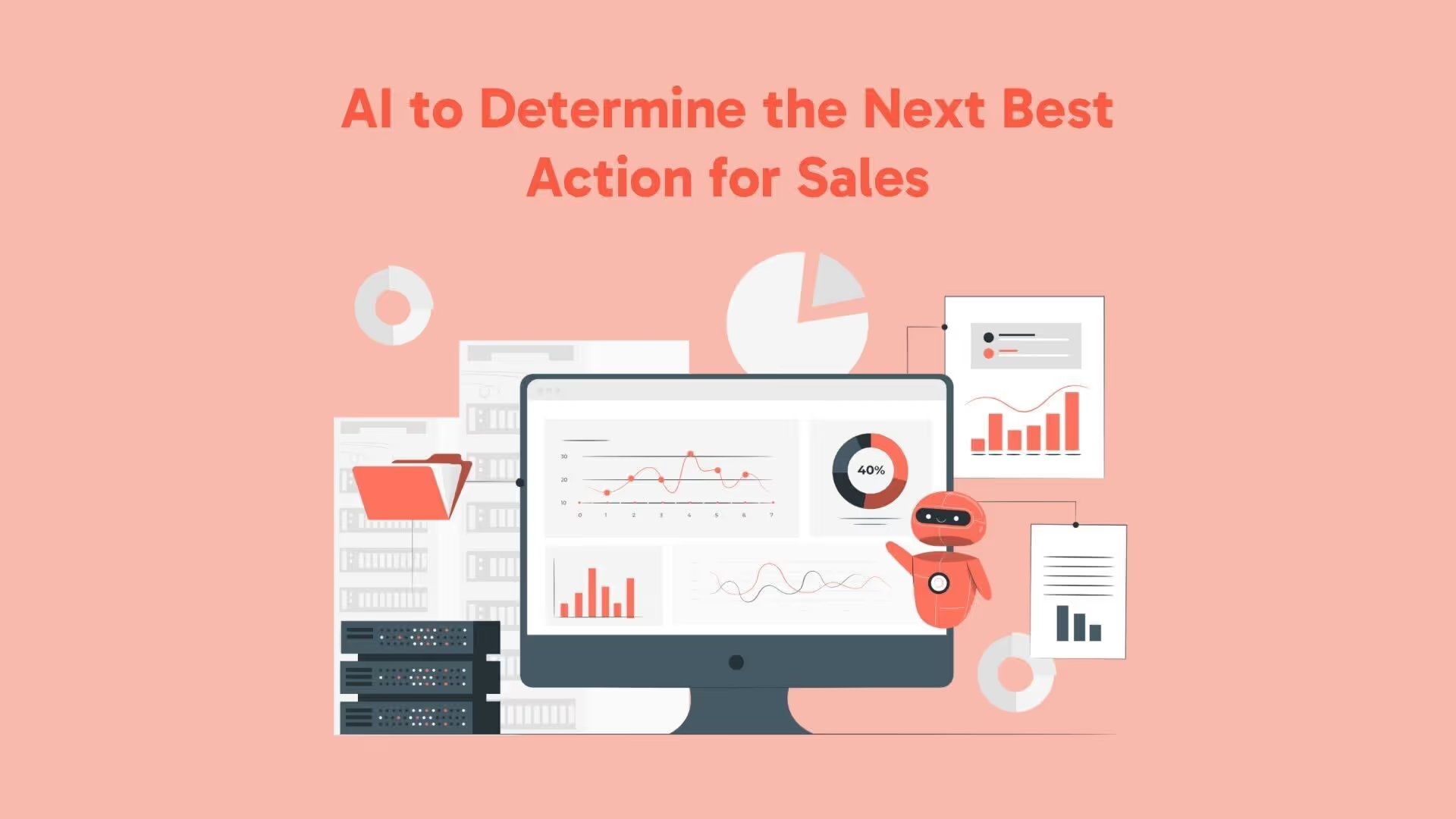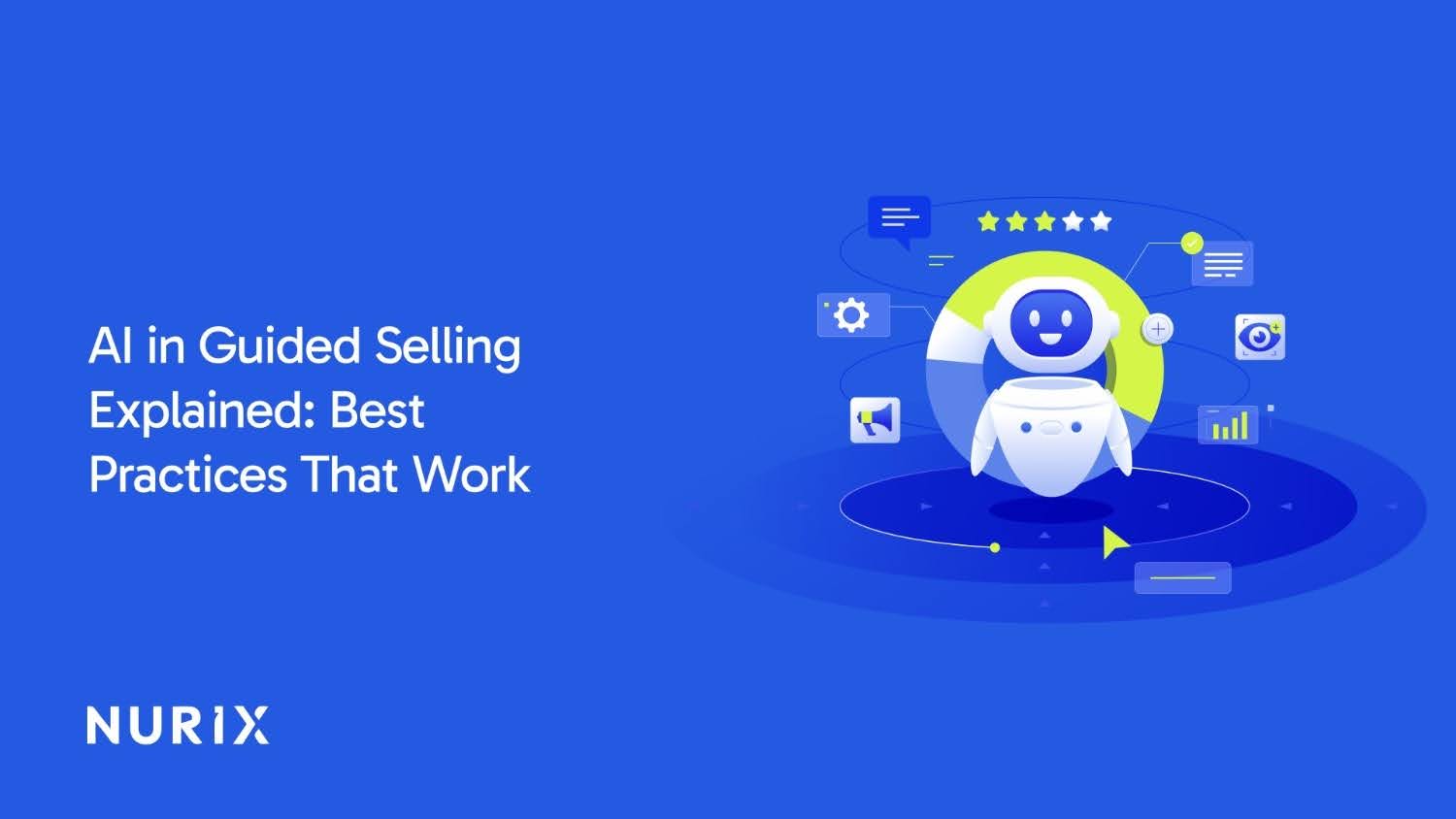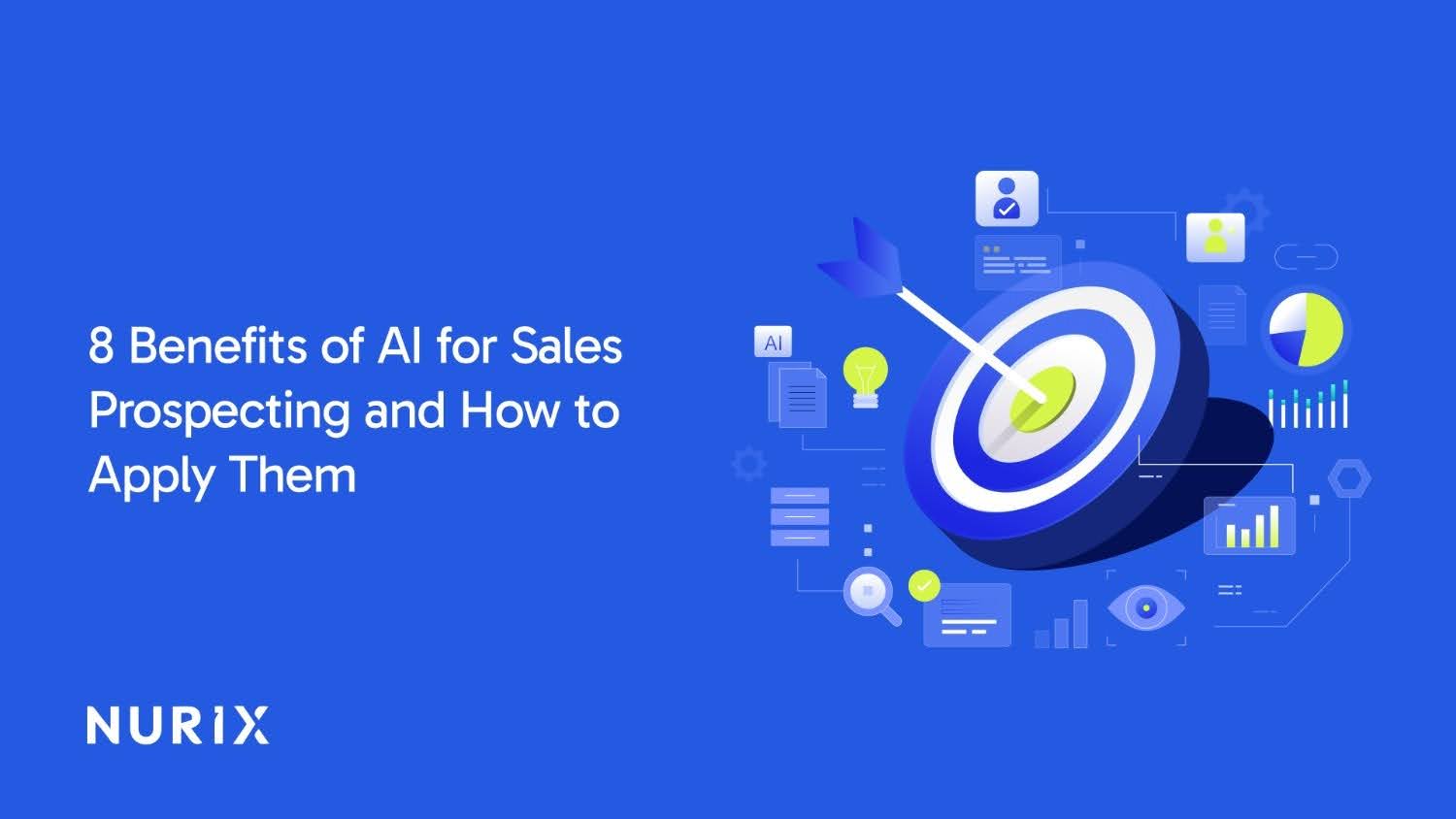Leveraging Artificial Intelligence for Sales Training
Sales training has come a long way from traditional methods, which, while still valuable, often need more adaptability in today's fast-paced market. AI in sales training programs is changing the game, offering personalized, data-driven, and efficient training solutions that can significantly boost your sales team's performance.
But how exactly does AI make such a difference? Let's explore how AI is revolutionizing sales training and how you can use it.
What is AI in Sales Training Programs?
AI isn't just about speed; it's about changing how sales teams learn and apply their skills. Various research suggests that incorporating AI in sales training can lead to significant improvements in efficiency and cost reduction. In sales training programs, AI is crucial in identifying learning gaps, tailoring content to individual needs, and providing a more engaging learning experience.
Understanding AI's Impact
AI's impact on sales training is profound, offering tailored learning experiences, enhanced engagement, and scalable solutions that meet the needs of modern sales teams.
- Personalized Learning Paths: AI in sales training programs tailors training content to each sales representative based on their performance and learning style. So, every representative gets the proper training for higher engagement and better retention.
- Enhanced Engagement: AI in sales training programs increases engagement levels and makes learning more enjoyable and effective by serving content in the format each representative prefers video, quizzes, or reading materials.
- Real-Time Feedback: AI tools provide instant feedback during training so representatives can correct mistakes and reinforce good practices on the fly. This instant feedback means faster learning and better application of skills in real life.
- Data-Driven Insights: AI in sales training programs analyzes training data to identify patterns and trends. This data helps organizations refine their training programs and focus on the areas that most impact sales performance.
- Scalability: AI allows companies to deliver consistent, high-quality training to large, dispersed sales teams. So, every representative, anywhere, gets the same level of training and support.
With the integration of AI in B2B Sales, the landscape of sales training is rapidly evolving, leading to more personalized and effective learning experiences. Now, let’s dive into the essential AI features that drive these transformative changes.
Essential AI Features for Sales Training

AI in sales training programs brings a bunch of cool features to sales training, making it more effective, interactive, and tailored to each individual. These features are backed by research and real-world examples, proving their worth in improving sales team performance.
- Adaptive Learning: Experiences tailored to every representative Adaptive learning, driven by AI, adjusts the training content based on a learner's progress and performance. For example, if a sales representative is good at cold calling but bad at closing, the AI focuses more on closing techniques.
- Real-Time Coaching: ‘Learning in the Moment’ AI-driven coaching tools analyze sales interactions whether it's a pitch, negotiation, or customer call, and give instant feedback. Sales representatives can adjust their strategy on the fly and see significant improvement in real scenarios.
- Simulated Scenarios: ‘Safe Practice, Real Results’ AI-powered simulations create realistic sales environments where representatives can practice without real-world pressure. These simulations are based on actual sales data and are super relevant and practical. AI simulations have been shown to significantly improve sales representatives' ability to handle customer objections, according to various industry reports.
- Data-Driven Insights: ‘Continuous Improvement’ AI tools collect and analyze data to measure training effectiveness. This data-driven approach allows companies to refine their programs, focus on what works, and discard what doesn't. Industry research, including reports from Forrester, indicates that AI-driven insights can contribute to increased employee productivity.
AI’s adaptive learning and real-time coaching are crucial for modern sales training, providing tailored and effective learning experiences. These features are particularly impactful during onboarding, as we’ll explore next.
AI in Sales Onboarding
Onboarding is a crucial phase in a sales representative's career, and AI can make this process faster, more effective, and more personalized. Companies that use AI in onboarding report quicker ramp-up times and higher initial performance levels.
- Accelerated Learning: AI-powered onboarding programs allow new hires to learn at their own pace, focusing on areas where they need the most improvement. This speeds up the onboarding process, helping new representatives become productive more quickly.
- Tailored Onboarding Modules: AI customizes onboarding content to match each new hire's background and experience level. For example, a representative with prior industry experience might skip basic modules and focus on advanced strategies.
- Continuous Assessment: AI-driven assessments evaluate a new hire's readiness to interact with clients, ensuring they are fully prepared before taking on customer-facing roles. This reduces the likelihood of errors and increases confidence.
- Real-Time Progress Tracking: Managers can use AI to monitor the progress of new hires in real-time, allowing them to intervene and provide additional support if needed. This ensures that no one falls behind during the onboarding process.
- Improved Retention Rates: LinkedIn's research shows that employees are likelier to stay with a company that invests in their development. AI-powered onboarding programs make this investment more effective, leading to higher retention rates.
AI accelerates onboarding by personalizing training and enhancing readiness, ensuring new hires quickly become effective. Moving forward, let’s see how AI continues to refine and improve sales skills beyond onboarding.
How AI Can Improve Sales Skills
Continuous improvement is critical to winning sales, and AI is your superpower. AI keeps your sales teams sharp and effective by identifying skill gaps, delivering targeted training, and providing personalized learning experiences. Here's how AI in sales training programs can supercharge your team's sales skills:
- Continuous Skill Monitoring: AI tracks and measures each sales representative's performance, identifying areas for improvement, such as call success rates or response times.
- Data-Driven Training Programs: AI in sales training programs creates training modules based on real-time performance data. For example, if a representative struggles to close deals, AI recommends targeted negotiation training. Research, including that from companies like McKinsey, suggests that AI-driven programs can considerably reduce training time and enhance sales performance.
- Personalized Learning: AI tailors training to each representative's learning style through videos, simulations, or reading materials. Studies, including those by Deloitte, suggest that personalized training approaches can significantly improve knowledge retention.
- Staying Current with Sales Trends: AI in sales training programs keeps your team updated with the latest sales techniques by analyzing industry trends and performance metrics. Gartner and other research firms indicate that leveraging AI to track industry trends can result in faster revenue growth.
- Building Confidence Through Ongoing Development: Regular AI-driven training boosts sales representatives' confidence and success rates. According to various studies, including those mentioned in Harvard Business Review, continuous AI-enhanced learning can lead to higher win rates.
AI provides continuous, targeted training that sharpens sales skills and keeps teams at the top of their game. With these skills in hand, the method of delivering training content becomes equally crucial, as we’ll examine in the next section.
Delivering Training Content with AI

How training content is delivered can significantly affect sales representatives' ability to receive and retain it. AI in sales training programs optimizes content delivery, ensuring that it's both engaging and effective.
- Customized Content Delivery: AI delivers content in the format and way each representative likes to learn. Video, interactive modules, or written content, AI ensures the training is engaging and effective.
- Dynamic Content Updates: AI can update training content in real-time with new data so representatives always get the most current and relevant information. This keeps the training program fresh and up to date with industry changes.
- Improved Knowledge Retention: By delivering content in the most effective way for each individual, AI increases retention rates so representatives can recall and apply what they've learned more effectively.
- Engaging Learning Experiences: AI-powered content management systems can include gamification elements like quizzes and challenges to make the learning experience more interactive and enjoyable.
- Efficient Content Management: AI-driven content management systems track the best training content and adjust future content accordingly. Continuous optimization means the training program is always getting better.
AI optimizes content delivery, making training both engaging and effective for better retention and application. However, to maximize these benefits, it's important to address the challenges of AI implementation.
Overcoming Challenges in AI-Driven Sales Training
While AI offers numerous benefits, addressing its implementation challenges is essential. Understanding these challenges and how to overcome them is critical to successful adoption.
- Managing Costs: The initial investment in AI in sales training programs can be significant, but companies can mitigate this by starting small and scaling up. Using cloud-based AI solutions can also reduce costs by not having to build infrastructure.
- Ensuring Data Privacy: Data privacy is crucial for AI to process so much data. Companies should implement robust security measures and comply with data protection regulations to protect sensitive info.
- Gaining Buy-In from Sales Teams: Resistance to new tech can be a barrier. To overcome this, get sales representatives involved in the AI implementation from day one, communicate the benefits clearly, and train them on how to use the new tools effectively.
- Regular System Updates: AI systems must be updated regularly to be effective. Companies should have a process for continuous monitoring and updating of AI tools to ensure they are working optimally and adapting to new challenges.
- Measuring ROI: Showing the ROI of AI in sales training is critical to getting continued support. Companies should track KPIs like training effectiveness, sales performance, and cost savings to measure the impact of AI.
Overcoming the challenges of implementing AI in sales training is essential for unlocking its full potential, paving the way for long-term success. With these hurdles managed, AI also enhances the role of managers and coaches, as we’ll see next.
AI Support for Sales Managers and Coaches
AI isn't just beneficial for sales representatives; it also provides valuable tools for sales managers and coaches. By leveraging AI in sales training programs, these leaders can better monitor progress, provide targeted coaching, and reduce administrative burdens.
- Real-Time Performance Monitoring: AI gives managers real-time insights into each representative's performance, allowing them to identify who needs additional support and who is excelling quickly.
- Data-Driven Coaching: AI in sales training programs provides a detailed analysis of each representative's strengths and weaknesses so coaches can give more targeted and practical guidance. Data-driven coaching equals better results.
- Automated Administrative Tasks: AI can automate sales processes that are time-consuming administrative tasks associated with managing a sales team, such as tracking progress and generating performance reports. This frees up time for managers to focus on more strategic activities.
- Enhanced Team Collaboration: AI tools can facilitate better communication and collaboration within sales teams by providing shared insights and centralized data. So everyone is on the same page and working towards the same goals.
- Improved Decision-Making: AI in sales training programs helps managers make better decisions by providing data-driven insights into team performance, training effectiveness, and market trends. So they can plan more strategically and get better results.
AI empowers managers with real-time insights and reduces administrative burdens, enabling more effective leadership. Looking ahead, the role of AI in sales training will continue to expand, further shaping the future of training programs.
The Future of AI in Sales Training Programs
AI already significantly impacts sales training, but its potential must be fully realized. As technology advances, we can expect AI in sales training programs to play an even more integral role in how sales teams are trained and developed.
- Integration with VR and AR: AI will be combined with VR and AR to create more realistic training experiences. Sales representatives will be able to practice in environments that mirror real-life scenarios.
- AI-Powered Predictive Analytics: AI in sales training programs will predict future training needs and sales trends so companies can prepare their teams for what's coming and an opportunity.
- Hyper-Personalization: As AI advances, it will allow for even more granular personalization of training content down to each individual sales representative's specific behaviors and learning styles.
- AI-Driven Continuous Learning: AI will provide continuous learning with just-in-time training that keeps representatives updated with the latest sales techniques and market developments.
- Increased Focus on Ethics and Compliance: As AI is more integrated into sales training, there will be a greater emphasis on ensuring that AI is used ethically and in compliance with regulations. This means safeguarding data privacy and avoiding biases in AI-driven decision-making.
Conclusion
The benefits of integrating AI in sales training programs are clear. From personalized learning paths to real-time feedback, AI offers tools that can significantly enhance the effectiveness of your sales training efforts. As technology evolves, the potential for even more significant improvements is vast. Now is the time to explore AI solutions for your sales team, ensuring they have the skills and knowledge they need to succeed in an increasingly competitive market.
Why choose Nurix AI? Because your sales team deserves the best. Achieve seamless integration, scale effortlessly, and secure unmatched results. Empower your team with Nurix AI! Experience the difference today!










